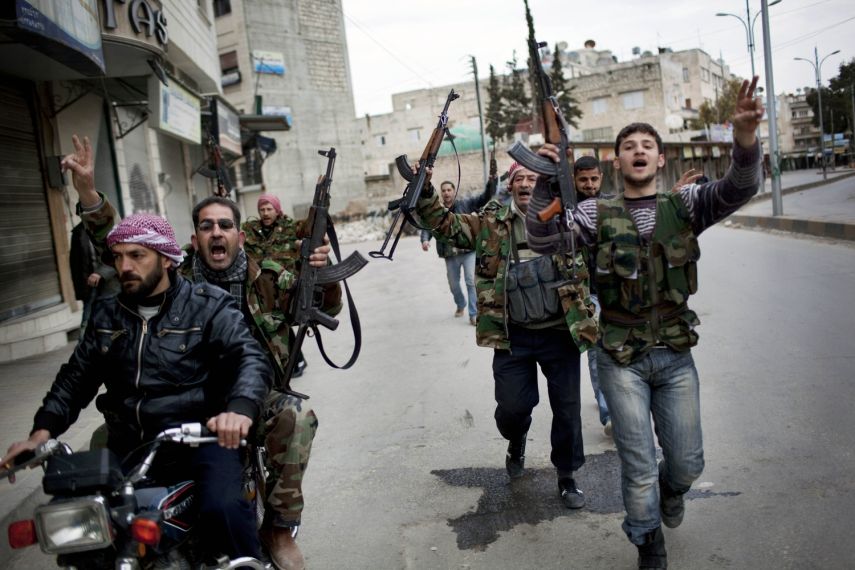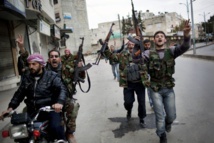In jihadist parlance, the "black flag" now flies over Idlib province, even as some local officials try to push back against the extremists in a bid to save whatever independence they have.
The consequences of the creeping takeover could be devastating for the estimated 2 million residents, many of them already displaced by six years of fighting in Syria.
If al-Qaeda’s wing, known as Hayat Tahrir al-Sham (HTS), asserts control over core governmental functions, the flow of humanitarian aid could be stopped.
There is also the fear that the United States, Russia or the Syrian government will step up attacks on the province.
"One airstrike will be enough for me to lose everything I have saved," says Mohammed, a shopkeeper who asked that we not use his full name. He says that the amount of goods on sale is already down.
The devastation of past airstrikes is just one factor that has contributed to support for HTS.
Other factors are the rejection of Syrian President Bashar al-Assad’s rule, disillusionment with the international community, the failure of moderate rebel groups, and existing conservative beliefs among Idlib populations, which have only hardened during the war.
"Whether HTS is here or not, there will be airstrikes," said Waleed, a supporter, dismissing any notion that the jihadist group would bear responsibility for more war.
However, the group has seen protests against its rule, going back years to when it began to assert itself over villages and towns. In part, this is because of al-Qaeda’s instinct towards political oppression, not just its religious outlook.
"The most horrible thing is that they are kidnapping any person who writes or makes a statement against them," says a local council member in a small town still not fully under the control of HTS, which used to be known as al-Nusra Front.
The group’s dominance in the province is all but certain, analysts say. "They are the unchallenged hegemony ... All the smaller groups have no choice but to [jump on the] bandwagon," says Sam Heller, a Beirut-based analyst with The Century Foundation.
The only other group that rivalled HTS was Ahrar al-Sham, also a hardline faction but one without an internationalist agenda. However, it was outmanoeuvred tactically, strategically and ideologically.
"Life is now very similar to Afghanistan under the Taliban," said one local resident, asking not to be named. There are pockets where people can smoke, but HTS is stepping up the confiscation of tobacco products and imposing dress codes.
Local relief organizations admit a growing sense of panic that, at any moment, international donors and charities will cut off Idlib after HTS has seized control over the border with Turkey, the only crossing to Idlib from outside Syria.
Ankara, which has long been reluctant to impose restrictions on Idlib, took steps in August to clamp down on the border, but is still allowing vital food and medicine supplies to enter.
The saving grace on the humanitarian front is that the international community does not want Idlib’s people to be starved out. Unless HTS does something reckless, donors will continue to send goods.
If there is no full assault on Idlib by HTS' many enemies, residents may have to adjust to life under a strict Islamist militant group, with women being forced to cover up and facing restrictions in public spaces.
The Druze, a religious minority in Idlib, have been forced to convert to Sunni Islam as the extremists have seized control step by step.
"Civilians are very angry, but helpless," says a local official, afraid to be named. "There is a state of horror in Idlib."
----------------------------------------------------------------------------------------------------------------------
The consequences of the creeping takeover could be devastating for the estimated 2 million residents, many of them already displaced by six years of fighting in Syria.
If al-Qaeda’s wing, known as Hayat Tahrir al-Sham (HTS), asserts control over core governmental functions, the flow of humanitarian aid could be stopped.
There is also the fear that the United States, Russia or the Syrian government will step up attacks on the province.
"One airstrike will be enough for me to lose everything I have saved," says Mohammed, a shopkeeper who asked that we not use his full name. He says that the amount of goods on sale is already down.
The devastation of past airstrikes is just one factor that has contributed to support for HTS.
Other factors are the rejection of Syrian President Bashar al-Assad’s rule, disillusionment with the international community, the failure of moderate rebel groups, and existing conservative beliefs among Idlib populations, which have only hardened during the war.
"Whether HTS is here or not, there will be airstrikes," said Waleed, a supporter, dismissing any notion that the jihadist group would bear responsibility for more war.
However, the group has seen protests against its rule, going back years to when it began to assert itself over villages and towns. In part, this is because of al-Qaeda’s instinct towards political oppression, not just its religious outlook.
"The most horrible thing is that they are kidnapping any person who writes or makes a statement against them," says a local council member in a small town still not fully under the control of HTS, which used to be known as al-Nusra Front.
The group’s dominance in the province is all but certain, analysts say. "They are the unchallenged hegemony ... All the smaller groups have no choice but to [jump on the] bandwagon," says Sam Heller, a Beirut-based analyst with The Century Foundation.
The only other group that rivalled HTS was Ahrar al-Sham, also a hardline faction but one without an internationalist agenda. However, it was outmanoeuvred tactically, strategically and ideologically.
"Life is now very similar to Afghanistan under the Taliban," said one local resident, asking not to be named. There are pockets where people can smoke, but HTS is stepping up the confiscation of tobacco products and imposing dress codes.
Local relief organizations admit a growing sense of panic that, at any moment, international donors and charities will cut off Idlib after HTS has seized control over the border with Turkey, the only crossing to Idlib from outside Syria.
Ankara, which has long been reluctant to impose restrictions on Idlib, took steps in August to clamp down on the border, but is still allowing vital food and medicine supplies to enter.
The saving grace on the humanitarian front is that the international community does not want Idlib’s people to be starved out. Unless HTS does something reckless, donors will continue to send goods.
If there is no full assault on Idlib by HTS' many enemies, residents may have to adjust to life under a strict Islamist militant group, with women being forced to cover up and facing restrictions in public spaces.
The Druze, a religious minority in Idlib, have been forced to convert to Sunni Islam as the extremists have seized control step by step.
"Civilians are very angry, but helpless," says a local official, afraid to be named. "There is a state of horror in Idlib."
----------------------------------------------------------------------------------------------------------------------









 Home
Home Politics
Politics











